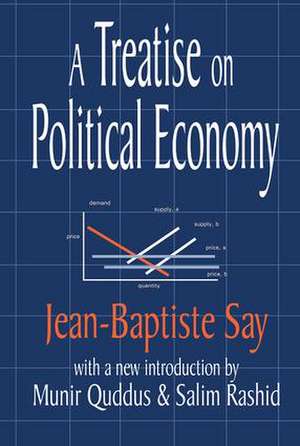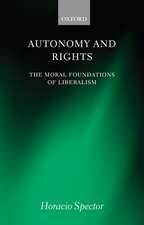A Treatise on Political Economy
Editat de Gary Hullen Limba Engleză Hardback – 20 sep 2017
Readers will see that Say is without doubt a luminary of classical economics. He single-handedly revived the study of political economy from its decline and kept it alive during a difficult period of opposition to liberal ideas. Say had a missionary belief that society will be best served if the principles of political economy are widely disseminated and understood by the citizenry. His organization of the Treatise's subject matter-production, distribution, and consumption of wealth-continues to guide authors of economic textbooks to this day. His treatment of the role of the entrepreneur as a contributor to production different from that of either the manager or the capitalist was the most advanced of his times.
In their new introduction, Quddus and Rashid note that present-day readers of this volume will benefit from the remarkable freshness of Say's ideas. The longevity of this volume proves that good ideas can successfully withstand the test of time. The role played by the Treatise in spreading liberal economic ideas and especially laissez-faire and free trade in France, the rest of Europe, and in the newly independent United States must also be appreciated. One suspects Say would have liked nothing better than to have his Treatise attract entrepreneurs, managers, and other non-specialist readers to economics. Given the emphasis on capitalism, free markets and unrestricted global trade republication of this great classic could not be more timely. Political economists, social philosophers, and those in business fields will find it indispensable reading.
| Toate formatele și edițiile | Preț | Express |
|---|---|---|
| Paperback (1) | 438.68 lei 6-8 săpt. | |
| Taylor & Francis – 31 mar 2001 | 438.68 lei 6-8 săpt. | |
| Hardback (1) | 980.00 lei 6-8 săpt. | |
| Taylor & Francis – 20 sep 2017 | 980.00 lei 6-8 săpt. |
Preț: 980.00 lei
Preț vechi: 1195.12 lei
-18% Nou
Puncte Express: 1470
Preț estimativ în valută:
187.76€ • 197.67$ • 154.98£
187.76€ • 197.67$ • 154.98£
Carte tipărită la comandă
Livrare economică 22 ianuarie-05 februarie 25
Preluare comenzi: 021 569.72.76
Specificații
ISBN-13: 9781138518544
ISBN-10: 1138518549
Pagini: 488
Dimensiuni: 152 x 229 mm
Greutate: 0.45 kg
Ediția:1
Editura: Taylor & Francis
Colecția Routledge
Locul publicării:Oxford, United Kingdom
ISBN-10: 1138518549
Pagini: 488
Dimensiuni: 152 x 229 mm
Greutate: 0.45 kg
Ediția:1
Editura: Taylor & Francis
Colecția Routledge
Locul publicării:Oxford, United Kingdom
Cuprins
Book I: Of The Production of Wealth.; I: Of What is to be Understood by the Term, Production.; II: Of The Different Kinds of Industry, and The Mode in which They Concur in Production.; III: Of The Nature of Capital, and the Mode in which it Concurs in the Business of Production.; IV: On Natural Agents that Assist in the Production of Wealth, and Specially of Land.; V: On the Mode in which Industry, Capital, and Natural Agents Unite in Production.; VI: Of Operations Alike Common to all Branches of Industry.; VII: Of the Labour of Mankind, of Nature, and of Machinery Respectively.; VIII: Of the Advantages and Disadvantages Resulting from Division of Labour, and of the Extent to which it may be Carried.; IX: Of the Different Methods of Employing Commercial Industry. And the Mode in which they Concur in Production.; X: Of the Transformations Undergone by Capital in the Progress of Production.; XI: Of the Formation and Multiplication of Capital.; XII: Of Unproductive Capital; XIII: Of Immaterial Products, or Values Consumed at the Moment of Production.; XIV: Of The Right of Property.; XV: Of The Demand or Market for Products.; XVI: Of The Benefits Resulting from The Quick Circulation of Money and Commodities.; XVII: Of the Effect of Government Regulations Intended to Influence Production.; XVIII: Of the Effect Upon National Wealth, Resulting from the Productive Efforts of Public Authority.; XIX: Of Colonies and their Products.; XX: Of Temporary and Permanent Emigration, Considered in Reference to National Wealth.; XXI: Of the Nature and Uses of Money.; XXII: Of Signs or Representatives of Money.; Book II: Of the Distribution of Wealth.; I: Of the Basis of Value; and of Supply and Demand.; II: The Sources of Revenue.; III: Of Real and Relative Variation of Price.; IV: Of Nominal Variation op Price, and op The Peculiar Value op Bullion and op Coin.; V: Of the Manner in which Revenue is Distributed Amongst Society.; VI: Of what Branches of Production Yield the most Liberal Recompense to Productive Agency.; VII: Of the Revenue of Industry.; VIII: Of the Revenue of Capital.; IX: Of the Revenue of Land.; X: Of the Effect of Revenue Derived by one Nation From Another.; XI: Of the Mode in which the Quantity of the Product Affects Population.; Book III: Of the Consumption of Wealth.; I: Of the Different Kinds of Consumption.; II: Of the Effect of Consumption in General.; III: Of the Effect of Productive Consumption.; IV: Of the Effect of Unproductive Consumption in General.; V: Of Individual Consumption—Its Motives and its Effects.; VI: On Public Consumption; VII: Of The Actual Conthibutors to Public Consumption.; VIII: Of Taxation.; IX: Of National Debt.
Descriere
Jean-Baptiste Say (1767-1832) has been described as a revolutionary, an author of scholarly books and popular tracts, a social philosopher, a successful entrepreneur-a remarkable Renaissance man












